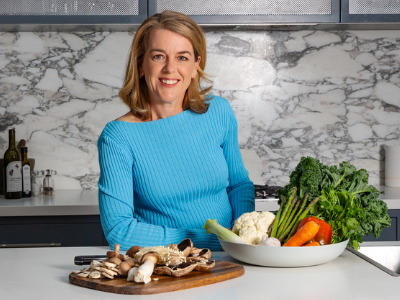
Who knew the humble mushroom could be so mighty for women?
Researchers have found mushrooms are a nutrient powerhouse for women, including mums-to-be, and it's just another reason Australian Mushroom Growers Association Dietitian and nationally renowned nutritionist Jane Freeman is encouraging women to boost their mushroom intake to support their overall health this Mother’s Day.
“The health needs of women are unique and can be very specific at various stages of our lives,” Ms Freeman says.
"However, new studies have found the addition of mushrooms to a daily diet can be beneficial to women at every stage of life while also providing health and nutrition advantages to their families.”
This celebrate mum, see our Mother’s Day-inspired recipes ahead of Sunday May 8, including an easy and delicious Mushroom Baked Breakfast stuffed with spinach, feta and egg.
“Mushrooms are rich in B-group vitamins and a good source in vitamin D which all women need, but these vitamins are even more essential for women who are pregnant,” Ms Freeman says.
Emerging research has found women who consumed 100g of mushrooms from pre-pregnancy to the 20th week of gestation significantly reduced their risk of pregnancy hypertension, which is a flag for pre-eclampsia affecting up to 10 percent of all pregnancies.
“Mushrooms can also contribute to higher folate and B12 requirements needed in pregnancy to support the growth needs of a developing baby’s nervous system and spinal cord.”
Ms Freeman explains Vitamin D is also important to help prevent complications like pre-eclampsia and diabetes in expectant mothers, and is similarly essential for women to keep their bones strong.
“Unfortunately, Vitamin D deficiency is common in Australia,” Ms Freeman adds. “Very few foods contain good sources of vitamin D, but mushrooms are unique for being one with the ability to meet daily vitamin D requirements when they are exposed to UV or sunlight.”
So, give the gift of health this Mother’s Day and spoil your mum with a tasty breakfast or lunch featuring the mighty mushroom.
Here are our top five reasons why Mum should eat Mushrooms this Mother's Day
(and every other day too!)
1. Mushrooms may support Immunity
Antioxidants are natural compounds in food that help neutralise the damaging free radicals produced by the body that tend to speed up the ageing process. Mushrooms contain the strong antioxidant ergothioneine, in addition, there are many other antioxidants in mushrooms that help our immune system, like glucans and flavonoids.
Australian research shows that mushrooms have polysaccharides that seem to stop cancer cells from forming and increase immunoglobulin A levels.
2. Mushrooms are great for mums-to-be
3. Mushrooms help with brain health
There is a good chance you have never heard of ergothioneine. It is a very powerful antioxidant that protects our DNA and body cells. It is so important that it has its own blood transporter – it is like having your own chauffeur driven limo carrying you around the body. Low levels of ergothioneine can cause cell damage, so it has been suggested that it is acting very much like a vitamin. On the other hand, a diet rich in ergothioneine is associated with a lower risk neurological disorders and early death. Ergothioneine is found in very few fruits or vegetables, making mushrooms a very useful source for vegetarians.
4. Mushrooms are packed with Vitamin D
About one in four Australian adults are deficient in Vitamin D deficiency. Very few foods contain good sources of vitamin D, but mushrooms are unique for being one with the ability to meet daily vitamin D requirements when they are exposed to UV or sunlight.
Vitamin D is also important to help prevent complications like pre-eclampsia and diabetes in expectant mothers, and is similarly essential for women to keep their bones strong.
5. Mushrooms can help with weight management
We know mushrooms are low in kilojoules, but another bonus that comes with adding mushrooms to your meals is that they are more filling. It is an amino acid, called glutamic acid, that is the main contributor to umami. Glutamic acid is a molecule that sends signals to the brain to regulate your appetite. Put simply, it helps you to avoid over-eating as it seems to satisfy your appetite quicker and encourage you to eat less during the day.
So, there you have it!
Mushrooms are not only a great tasting addition to the daily meal, but they are also a nutrient powerhouse for women.
Note: the information in this article is meant as general information only. For specific, personal advice on any medical condition, please see your doctor.
AMGA Dietitian - Jane Freeman
Jane is an internationally regarded and experienced dietitian and nutritionist, is an IOC (International Olympic Committee) qualified sports nutritionist, Leiths qualified cook and an award-winning author.
As a practicing dietitian and director for CANutriton, a cancer specialist nutrition practice in Sydney, Jane is big mushroom lover and passionate about delivering practical nutrition advice that is easy to understand and adopt.
References:
Phillips KM, Ruggio DM, Haytowitz DB. Folate composition of 10 types of mushrooms determined by liquid chromatography-mass spectrometry. Food Chem. 2011 Nov 15;129(2):630-636. doi: 10.1016/j.foodchem.2011.04.087. Epub 2011 May 4. PMID: 30634279.
Sun L, Niu Z. A mushroom diet reduced the risk of pregnancy-induced hypertension and macrosomia: a randomized clinical trial. Food Nutr Res. 2020;64:10.29219/fnr.v64.4451. Published 2020 Jun 8. doi:10.29219/fnr.v64.4451
Silvia Fogacci, Federica Fogacci, Maciej Banach, Erin D. Michos, Adrian V. Hernandez, Gregory Y.H. Lip, Michael J. Blaha, Peter P. Toth, Claudio Borghi, Arrigo F.G. Cicero. Vitamin D supplementation and incident preeclampsia: A systematic review and meta-analysis of randomized clinical trials, Clinical Nutrition, Volume 39, Issue 6,2020,Pages 1742-1752,ISSN 0261-5614, https://doi.org/10.1016/j.clnu.2019.08.015
Cardwell G, Bornman JF, James AP, et al. A review of mushrooms as a potential source of dietary vitamin D. Nutrients 2018;10:1498.
Join our Mushroom Lovers Club!
Receive delicious Mushroom recipies and much more.






